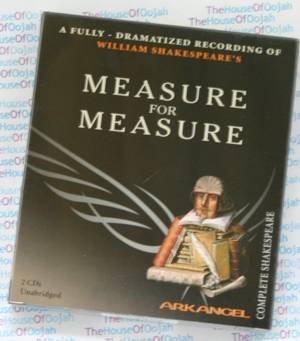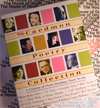Measure for Measure by William Shakespeare - Unabridged Audio CD
Brand New : Unabridged 2 Audio CDs 149 minutes
Vincentio, the Duke of Vienna, makes it known that he intends to leave the city on a diplomatic mission. He leaves the government in the hands of a strict judge, Angelo. Under the Duke's government, the city's harsh laws against fornication have been laxly enforced, but Angelo, who later reveals himself as a hypocrite, is known to be a hard-liner on matters of sexual immorality. Claudio, a young nobleman, is betrothed to Juliet; having put off their wedding, he makes her pregnant before wedlock. For this act of fornication he is punished by Angelo. Although he is willing to marry her, he is sentenced to death. Claudio's friend Lucio visits Claudio's sister Isabella, a postulant nun, and asks her to intercede with Angelo on Claudio's behalf. Isabella obtains an audience with Angelo, and pleads to him for mercy. Over the course of two scenes between Angelo and Isabella, it becomes clear that he harbours lustful thoughts for her, and he eventually offers her a deal: Angelo will spare Claudio's life if Isabella will yield him her virginity. Isabella refuses, but she also realises that (due to Angelo's austere reputation) she will not be believed if she makes a public accusation against him. Instead she visits her brother in prison, and counsels him to prepare himself for death. Claudio vehemently begs Isabella to save his life, but Isabella refuses. The Duke has not in fact left the city, but remains there disguised as a friar, in order to spy on his city's affairs, and especially the actions of Angelo. In his guise as a friar he befriends Isabella and arranges two tricks to thwart the evil intentions of Angelo:
1. First, a "bed trick" is arranged. Angelo has previously refused to fulfill the betrothal binding him to Mariana, because her dowry was lost at sea. Isabella sends word to Angelo that she has decided to submit to him, making it a condition of their meeting that it occurs in perfect darkness and silence. In fact, Mariana agrees to take Isabella's place, and she has sex with Angelo, although he continues to believe he has enjoyed Isabella. (In some interpretations of the law, this constituted consummation of their betrothal, and so marriage.)
2. Contrary to expectation, Angelo goes back on his word, sending a message to the prison that he wishes to see Claudio's head, which necessitates the "head trick." The Duke first attempts to arrange the execution of another prisoner whose head can be sent instead of Claudio's. However, the villain Barnardine refuses to be executed in his current drunken state. As luck would have it, however, a pirate named Ragozine, of similar appearance to Claudio, has recently died of a fever, so his head is sent to Angelo, instead.
This main plot concludes with the "return" to Vienna of the Duke in his own person. Isabella and Mariana publicly petition him, and he hears their claims against Angelo, which Angelo smoothly denies. The scene builds a sense that Friar Ludowick will be blamed for the "false" accusations levelled against Angelo. The Duke leaves Angelo to be judge of the cause against Ludowick, but returns in disguise moments later when Ludowick is summoned. Eventually the friar reveals himself to be the duke, thereby exposing Angelo as a liar and Isabella and Mariana as truthful. He proposes execution for him -- with his estate going to Mariana as her new dowry, 'to buy you a better husband'. Mariana pleads for Angelo's life, even enlisting the aid of Isabella (who is not yet aware her brother Claudio is still living). Heeding the request of the two women, the Duke is merciful to Angelo, but compels him to marry Mariana. The Duke then proposes marriage to Isabella. Isabella makes no reply, and her reaction is interpreted differently in different productions: her silent acceptance of his proposal is the most common in performance. A sub-plot concerns Claudio's friend Lucio, who frequently slanders the duke to the friar, and in the last act slanders the friar to the duke, providing opportunities for comic consternation on Vincentio's part, and landing Lucio in trouble when it is revealed that the duke and the friar are one and the same person. His punishment, like Angelo's, is to be forced into an unwanted marriage: in his case with the whore Kate Keepdown.

About the Author William Shakespeare
(baptised April 26 1564 - died April 23 1616)
William Shakespeare (also spelled Shakspere, Shaksper, Shaxper, and Shake-speare, due to the fact that spelling in Elizabethan times was not fixed and absolute[8]) was born in Stratford-upon-Avon in April 1564, the son of John Shakespeare, a successful glover and alderman from Snitterfield, and of Mary Arden, a daughter of the gentry. His birth is assumed to have occurred at the family house on Henley Street. Shakespeare's christening record dates to April 26 of that year. Because christenings were performed within a few days of birth, tradition has settled on April 23 as his birthday. This date provides a convenient symmetry because Shakespeare died on the same day, April 23 (May 3 on the Gregorian calendar), in 1616.
Shakespeare probably attended King Edward VI Grammar School in central Stratford. While the quality of Elizabethan-era grammar schools was uneven, the school probably would have provided an intensive education in Latin grammar and literature. It is presumed that the young Shakespeare attended this school, since as the son of a prominent town official he was entitled to do so for free (although his attendance cannot be confirmed because the school's records have not survived). At the age of eighteen, he married Anne Hathaway, who was twenty-six, on November 28, 1582. One document identified her as being "of Temple Grafton," near Stratford, and the marriage may have taken place there. Two neighbours of Anne posted bond that there were no impediments to the marriage. There appears to have been some haste in arranging the ceremony, presumably because Anne was three months pregnant.
After his marriage, Shakespeare left few traces in the historical record until he appeared on the London theatrical scene. Indeed, the late 1580s are known as Shakespeare's "lost years" because no evidence has survived to show exactly where he was or why he left Stratford for London. On May 26, 1583, Shakespeare's first child, Susanna, was baptised at Stratford. Twin children, a son, Hamnet, and a daughter, Judith, were baptised on February 2, 1585. Hamnet died in 1596.
London and theatrical career
By 1592 Shakespeare was a playwright in London; he had enough of a reputation for Robert Greene to denounce him as "an upstart crow, beautified with our feathers, that with his Tygers hart wrapt in a Players hyde, supposes he is as well able to bombast out a blanke verse as the best of you: and being an absolute Johannes factotum, is in his owne conceit the onely Shake-scene in a countrey." (The italicised line parodies the phrase, "Oh, tiger's heart wrapped in a woman's hide" which Shakespeare wrote in Henry VI, part 3.)
By late 1594 Shakespeare was an actor, writer and part-owner of a playing company, known as the Lord Chamberlain's Men - the company took its name, like others of the period, from its aristocratic sponsor, in this case the Lord Chamberlain. The group became popular enough that after the death of Elizabeth I and the coronation of James I (1603), the new monarch adopted the company and it became known as the King's Men. Shakespeare's writing shows him to indeed be an actor, with many phrases, words, and references to acting, but there isn't an academic approach to the art of theatre that might be expected.
By 1596 Shakespeare had moved to the parish of St. Helen's, Bishopsgate, and by 1598 he appeared at the top of a list of actors in Every Man in His Humour written by Ben Jonson. Also by 1598 his name began to appear on the title pages of his plays, presumably as a selling point.
There is a tradition that Shakespeare, in addition to writing many of the plays his company enacted, and being concerned as part-owner of the company with business and financial details, continued to act in various parts such as the ghost of Hamlet's father, Adam in ""As You Like It"", and as the Chorus in ""Henry V"".
He appears to have moved across the Thames River to Southwark sometime around 1599. By 1604, he had moved again, north of the river, where he lodged just north of St Paul's Cathedral with a Huguenot family named Mountjoy. His residence there is worth noting because he helped arrange a marriage between the Mountjoys' daughter and their apprentice Stephen Bellott. Bellott later sued his father-in-law for defaulting on part of the promised dowry, and Shakespeare was called as a witness.
Various documents recording legal affairs and commercial transactions show that Shakespeare grew rich enough during his stay in London to buy a property in Blackfriars, London and own the second-largest house in Stratford, New Place.
Later years
Shakespeare's last two plays were written in 1613, after which he appears to have retired to Stratford. He died on April 23 1616, at the age of fifty-two, on the same date (though not same day for England was still functioning under the Julian calendar) as Spanish writer and poet Miguel de Cervantes. He also died on his birthday, if the speculation that he was born on April 23 is correct. He was married to Anne until his death and was survived by his two daughters, Susanna and Judith. Susanna married Dr John Hall, but there are no direct descendants of the poet and playwright alive today.
Shakespeare is buried in the chancel of Holy Trinity Church in Stratford-upon-Avon. He was granted the honour of burial in the chancel not on account of his fame as a playwright but for purchasing a share of the tithe of the church for £440 (a considerable sum of money at the time). A monument placed by his family on the wall nearest his grave features a bust of him posed in the act of writing. Each year on his claimed birthday, a new quill pen is placed in the writing hand of the bust.
He is believed to have written the epitaph on his tombstone:
Good friend, for Jesus' sake forbear,
To dig the dust enclosed here.
Blest be the man that spares these stones,
But cursed be he that moves my bones.
|



 0 Items (Empty)
0 Items (Empty)


